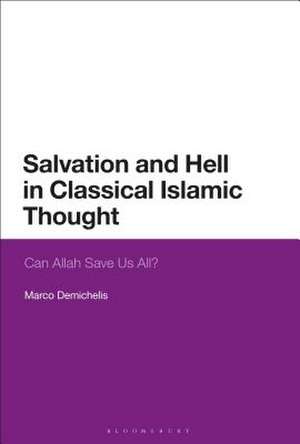Salvation and Hell in Classical Islamic Thought: Can Allah Save Us All?
Autor Marco Demichelisen Limba Engleză Paperback – 22 ian 2020
| Toate formatele și edițiile | Preț | Express |
|---|---|---|
| Paperback (1) | 224.11 lei 6-8 săpt. | |
| Bloomsbury Publishing – 22 ian 2020 | 224.11 lei 6-8 săpt. | |
| Hardback (1) | 715.19 lei 6-8 săpt. | |
| Bloomsbury Publishing – 11 iul 2018 | 715.19 lei 6-8 săpt. |
Preț: 224.11 lei
Preț vechi: 288.56 lei
-22% Nou
Puncte Express: 336
Preț estimativ în valută:
42.88€ • 45.86$ • 35.76£
42.88€ • 45.86$ • 35.76£
Carte tipărită la comandă
Livrare economică 17 aprilie-01 mai
Preluare comenzi: 021 569.72.76
Specificații
ISBN-13: 9781350147799
ISBN-10: 1350147796
Pagini: 240
Dimensiuni: 156 x 234 mm
Greutate: 0.34 kg
Editura: Bloomsbury Publishing
Colecția Bloomsbury Academic
Locul publicării:London, United Kingdom
ISBN-10: 1350147796
Pagini: 240
Dimensiuni: 156 x 234 mm
Greutate: 0.34 kg
Editura: Bloomsbury Publishing
Colecția Bloomsbury Academic
Locul publicării:London, United Kingdom
Caracteristici
Draws on Islamic theology, philosophy and theology, and the interplay of the concepts between these traditions
Notă biografică
Marco Demichelis is Marie Curie Research Fellow at the Institute for Culture and Society, University of Navarra, Spain. His books include Contemporary Islamic Thought (2016), Islamic Ethics (2016), Religious Nationalism (2016).
Cuprins
AcknowledgementsNotes on Dates and AbbreviationsIntroduction 1. Islamic Piety and Annihilation 2. Kalam and the eschatological interpretation of the material and the empyrean3. Islamic philosophy (Falsafa) and the Annihilation of the non-body rationally explained4. The final Islamic understanding 5. ConclusionBibliographyIndex
Recenzii
The work by Marco Demichelis is a sustained invitation to revisit the diversity of theological thought in Islam, the multiplicity of anthropologies engaged, which stimulates its reader on every page.
[T]he substance of the book is thoughtfully presented and centers on the essentially eschatological focus of Islam.
Drawing on meticulous reading and synthesis of Islamic sources this is a welcome account of the development of Islamic eschatology during the formative years of Islamic intellectual life. A gift for students of Islamic intellectual history, theology (esp. eschatology) and comparative religion (esp. those studying the Abrahamic traditions), and an excellent contribution to the burgeoning scholarship on Islamic views on salvation and eternity of hell.
Demichelis has provided an important contribution to the field of Islamic theology and Islamic intellectual history more broadly with this meticulous diachronic study of hell and the doctrine of its annihilation. Voices from different fields of religious knowledge and historical time periods are deftly marshaled and placed into conversation with one another to reveal a rich and dynamic theological tradition of salvation.
A clear and highly documented journey of nine centuries of orthodox and heterodox Islamic thought, through proto-sufism, kalam, and philosophy, concerning the creation of Heaven and Hell, their eternity or end, their inhabitants (is salvation universal or restricted to believers? is Hell a temporary purgatory for sinful believers?), questions that affect the theology of God's omnipotence and justice, and to which the simplistic ideas of present-day jihadism confers astonishing actuality.
[T]he substance of the book is thoughtfully presented and centers on the essentially eschatological focus of Islam.
Drawing on meticulous reading and synthesis of Islamic sources this is a welcome account of the development of Islamic eschatology during the formative years of Islamic intellectual life. A gift for students of Islamic intellectual history, theology (esp. eschatology) and comparative religion (esp. those studying the Abrahamic traditions), and an excellent contribution to the burgeoning scholarship on Islamic views on salvation and eternity of hell.
Demichelis has provided an important contribution to the field of Islamic theology and Islamic intellectual history more broadly with this meticulous diachronic study of hell and the doctrine of its annihilation. Voices from different fields of religious knowledge and historical time periods are deftly marshaled and placed into conversation with one another to reveal a rich and dynamic theological tradition of salvation.
A clear and highly documented journey of nine centuries of orthodox and heterodox Islamic thought, through proto-sufism, kalam, and philosophy, concerning the creation of Heaven and Hell, their eternity or end, their inhabitants (is salvation universal or restricted to believers? is Hell a temporary purgatory for sinful believers?), questions that affect the theology of God's omnipotence and justice, and to which the simplistic ideas of present-day jihadism confers astonishing actuality.
